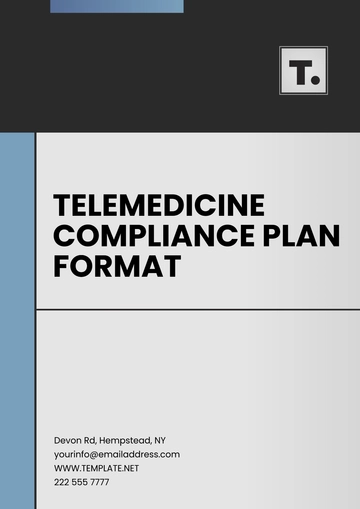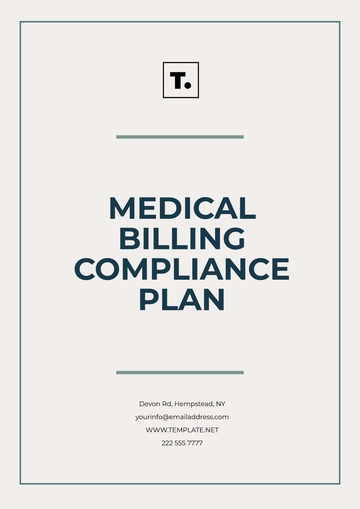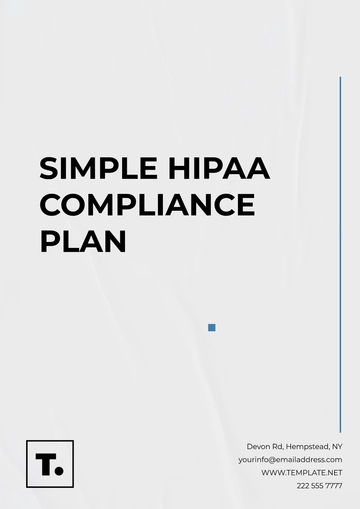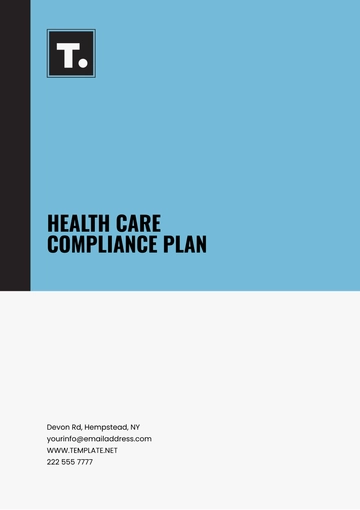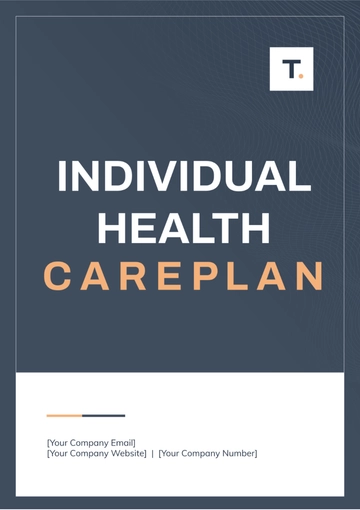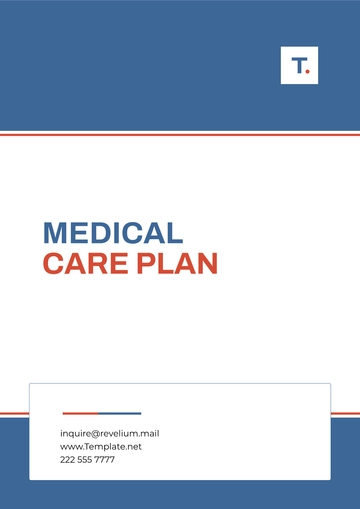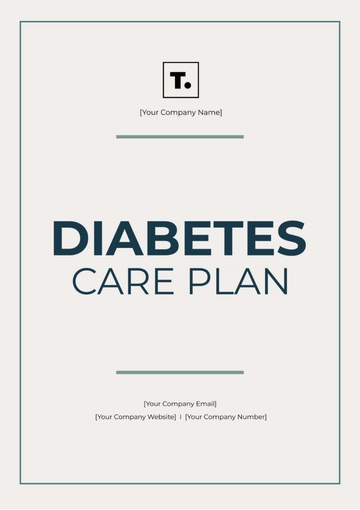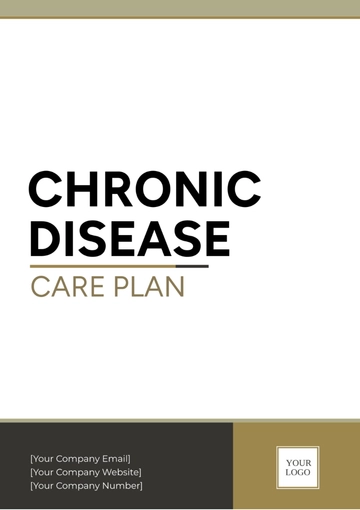Free Chronic Disease Care Plan
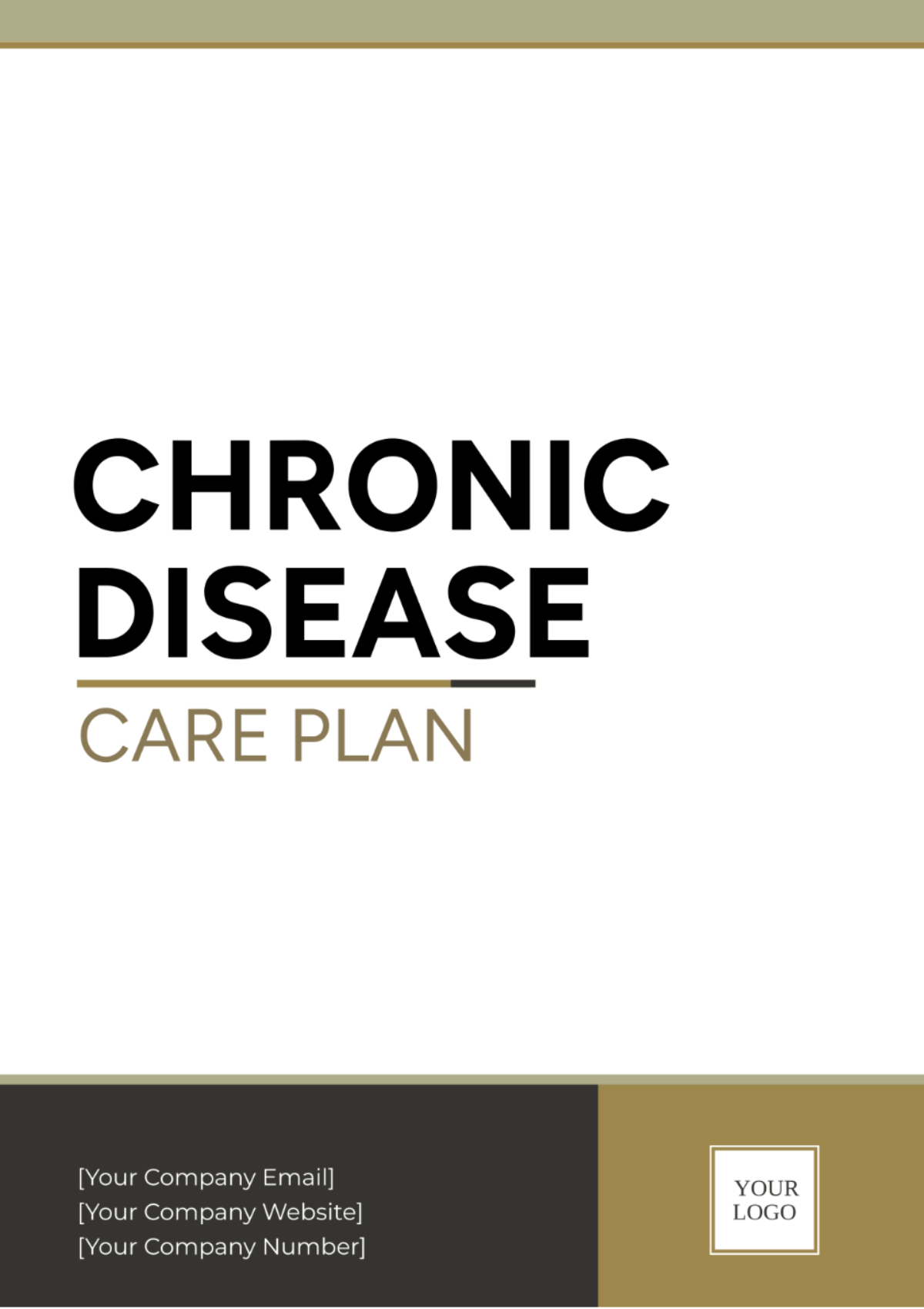
_____________________________________________________________________________________
I. Patient Information
Name: [Your Name]
Age: [Patient's Age]
Gender: [Patient's Gender]
Medical History: [Brief overview of patient's medical history]
Current Medications: [List of medications including dosage and frequency]
_____________________________________________________________________________________
II. Diagnosis and Assessment
Chronic Condition: Type 2 Diabetes
Duration: Diagnosed [Number] years ago
Severity: [Mild/Moderate/Severe]
Complications: [Any associated complications such as neuropathy, retinopathy, etc.]
Comorbidities: [List of any other medical conditions the patient may have]
_____________________________________________________________________________________
III. Treatment Goals
Achieve and maintain blood glucose levels within the target range.
Prevent or delay the progression of diabetes-related complications.
Improve overall quality of life.
Promote adherence to prescribed treatment plans and lifestyle modifications.
_____________________________________________________________________________________
IV. Care Team
Endocrinologist: [Endocrinologist Name]
Diabetes Nurse Educator: [Diabetes Nurse Educator Name]
Dietitian: [Dietitian Name]
Primary Care Physician: [Primary Care Physician Name]
Pharmacist: [Pharmacist Name]
_____________________________________________________________________________________
V. Treatment Plan
Medications
Metformin: [Dosage], [Frequency]
Insulin (Basal/Bolus): [Type], [Dosage], [Frequency]
Blood Glucose Monitoring
Check blood glucose levels before meals and at bedtime.
Record results in a blood glucose log.
Diet
Follow a balanced meal plan emphasizing whole grains, lean proteins, fruits, and vegetables.
Limit intake of refined sugars and carbohydrates.
Physical Activity
Engage in at least [Number] minutes of moderate-intensity exercise most days of the week.
Incorporate both aerobic and strength training exercises.
Regular Follow-Up
Schedule appointments with the endocrinologist every [Frequency].
Review blood glucose logs and adjust treatment plan as needed.
_____________________________________________________________________________________
VI. Lifestyle Recommendations
Smoking Cessation
Encourage smoking cessation if applicable.
Stress Management
Practice stress-reducing techniques such as deep breathing exercises, meditation, or yoga.
Sleep Hygiene
Maintain a regular sleep schedule and aim for 7-8 hours of quality sleep per night.
_____________________________________________________________________________________
VII. Monitoring and Follow-Up
Blood Pressure Monitoring
Check blood pressure at every doctor's visit.
A1C Testing
Conduct A1C tests every [Frequency] to assess long-term blood glucose control.
Comprehensive Diabetic Foot Exam
Perform foot exams annually to screen for neuropathy and other foot complications.
_____________________________________________________________________________________
VIII. Patient Education
Diabetes Self-Management
Provide education on blood glucose monitoring, medication administration, and recognizing signs of hypo/hyperglycemia.
Nutrition Counseling
Offer guidance on meal planning, carbohydrate counting, and portion control.
Medication Adherence
Discuss the importance of taking medications as prescribed and address any concerns or barriers to adherence.
_____________________________________________________________________________________
IX. Emergency Contact Information
In case of a medical emergency, contact [Guardian's Name] at [Guardian's Phone Number].
For urgent medical advice outside of office hours, call [Emergency Hotline Number].
_____________________________________________________________________________________
- 100% Customizable, free editor
- Access 1 Million+ Templates, photo’s & graphics
- Download or share as a template
- Click and replace photos, graphics, text, backgrounds
- Resize, crop, AI write & more
- Access advanced editor
Streamline your patient management with Template.net's Chronic Disease Care Plan Template. This fully customizable and editable template ensures comprehensive care documentation. Effortlessly tailored to your needs, it’s editable in our AI Editor Tool, providing a seamless, user-friendly experience. Enhance your efficiency and patient care today with Template.net’s premier solution.
You may also like
- Finance Plan
- Construction Plan
- Sales Plan
- Development Plan
- Career Plan
- Budget Plan
- HR Plan
- Education Plan
- Transition Plan
- Work Plan
- Training Plan
- Communication Plan
- Operation Plan
- Health And Safety Plan
- Strategy Plan
- Professional Development Plan
- Advertising Plan
- Risk Management Plan
- Restaurant Plan
- School Plan
- Nursing Home Patient Care Plan
- Nursing Care Plan
- Plan Event
- Startup Plan
- Social Media Plan
- Staffing Plan
- Annual Plan
- Content Plan
- Payment Plan
- Implementation Plan
- Hotel Plan
- Workout Plan
- Accounting Plan
- Campaign Plan
- Essay Plan
- 30 60 90 Day Plan
- Research Plan
- Recruitment Plan
- 90 Day Plan
- Quarterly Plan
- Emergency Plan
- 5 Year Plan
- Gym Plan
- Personal Plan
- IT and Software Plan
- Treatment Plan
- Real Estate Plan
- Law Firm Plan
- Healthcare Plan
- Improvement Plan
- Media Plan
- 5 Year Business Plan
- Learning Plan
- Marketing Campaign Plan
- Travel Agency Plan
- Cleaning Services Plan
- Interior Design Plan
- Performance Plan
- PR Plan
- Birth Plan
- Life Plan
- SEO Plan
- Disaster Recovery Plan
- Continuity Plan
- Launch Plan
- Legal Plan
- Behavior Plan
- Performance Improvement Plan
- Salon Plan
- Security Plan
- Security Management Plan
- Employee Development Plan
- Quality Plan
- Service Improvement Plan
- Growth Plan
- Incident Response Plan
- Basketball Plan
- Emergency Action Plan
- Product Launch Plan
- Spa Plan
- Employee Training Plan
- Data Analysis Plan
- Employee Action Plan
- Territory Plan
- Audit Plan
- Classroom Plan
- Activity Plan
- Parenting Plan
- Care Plan
- Project Execution Plan
- Exercise Plan
- Internship Plan
- Software Development Plan
- Continuous Improvement Plan
- Leave Plan
- 90 Day Sales Plan
- Advertising Agency Plan
- Employee Transition Plan
- Smart Action Plan
- Workplace Safety Plan
- Behavior Change Plan
- Contingency Plan
- Continuity of Operations Plan
- Health Plan
- Quality Control Plan
- Self Plan
- Sports Development Plan
- Change Management Plan
- Ecommerce Plan
- Personal Financial Plan
- Process Improvement Plan
- 30-60-90 Day Sales Plan
- Crisis Management Plan
- Engagement Plan
- Execution Plan
- Pandemic Plan
- Quality Assurance Plan
- Service Continuity Plan
- Agile Project Plan
- Fundraising Plan
- Job Transition Plan
- Asset Maintenance Plan
- Maintenance Plan
- Software Test Plan
- Staff Training and Development Plan
- 3 Year Plan
- Brand Activation Plan
- Release Plan
- Resource Plan
- Risk Mitigation Plan
- Teacher Plan
- 30 60 90 Day Plan for New Manager
- Food Safety Plan
- Food Truck Plan
- Hiring Plan
- Quality Management Plan
- Wellness Plan
- Behavior Intervention Plan
- Bonus Plan
- Investment Plan
- Maternity Leave Plan
- Pandemic Response Plan
- Succession Planning
- Coaching Plan
- Configuration Management Plan
- Remote Work Plan
- Self Care Plan
- Teaching Plan
- 100-Day Plan
- HACCP Plan
- Student Plan
- Sustainability Plan
- 30 60 90 Day Plan for Interview
- Access Plan
- Site Specific Safety Plan
